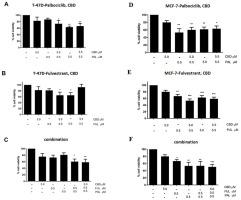Effect of combining CBD with standard breast cancer therapeutics
Abstract
Breast cancer is the most common malignancy in women worldwide. Sixty-five percent of breast cancers are estrogen and/or progesterone receptor positive. Estrogen receptor expression is a prognostic and predictive biomarker of response to endocrine therapy, which consists of the selective estrogen receptor modulator tamoxifen, aromatase inhibitors, and the selective estrogen receptor degrader fulvestrant. Cannabidiol is a phytocannabinoid that is emerging as a potential therapeutic agent. The aim of this study was to investigate the effect of cannabidiol on estrogen receptor-positive and estrogen receptor-negative representative breast cancer cell lines in combination with standard therapeutic agents used in clinical practice. To compare the effects of cannabidiol on breast cancer cell viability, cancer cell lines were exposed to increasing concentrations of cannabidiol. The effects of cannabidiol in combination with the endocrine therapeutics tamoxifen, fulvestrant, and the cyclin-dependent kinase inhibitor palbociclib on breast cancer cell viability were examined. We demonstrated that cannabidiol dose-dependently decreased the viability of all breast cancer cell lines independent of estrogen receptor expression. The addition of cannabidiol to tamoxifen had an additive negative effect on cell viability in ER+ in estrogen receptor positive T-47D line. Cannabidiol did not attenuate the effect of standard treatment of hormone receptor-positive breast cancer with fulvestrant and palbociclib. In addition, cannabidiol did not attenuate the effect of standard treatment of triple-negative breast cancer and human epidermal growth factor receptor 2 positive breast cancer cell lines with trastuzumab and cisplatin.


 求助内容:
求助内容: 应助结果提醒方式:
应助结果提醒方式:


